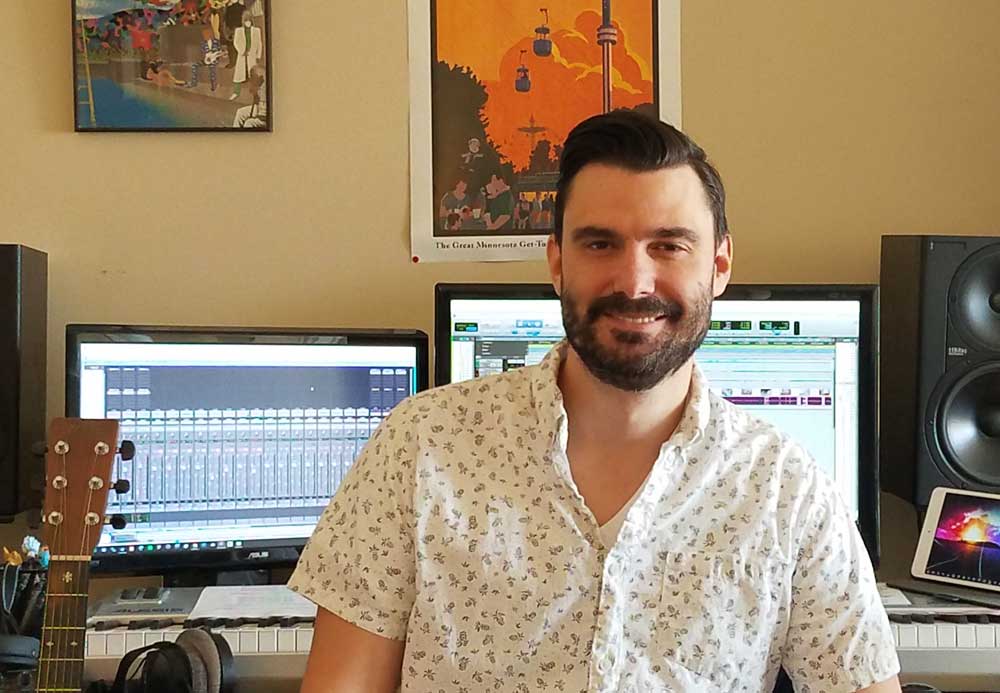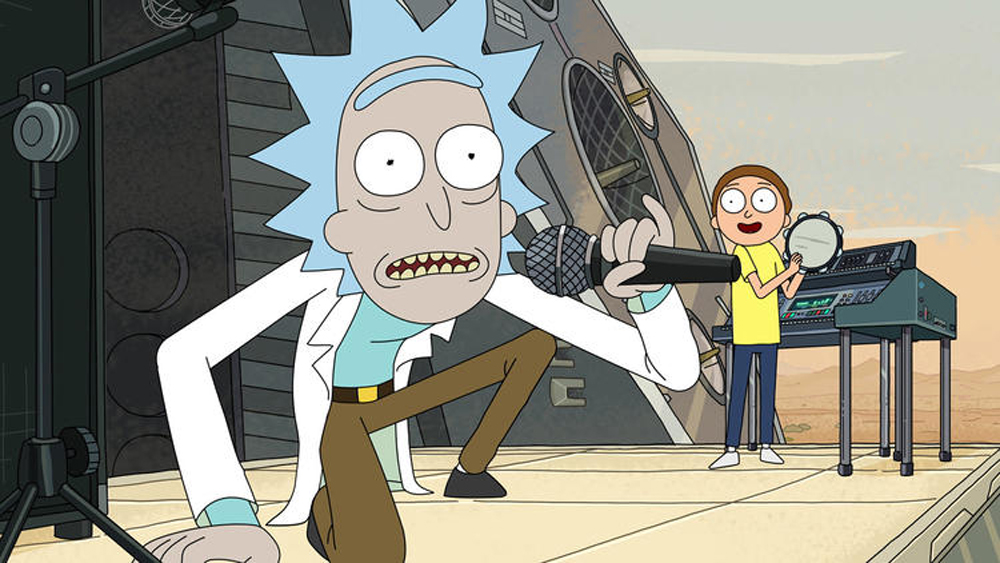
Composer Ryan Elder has helped define the distinctive personality of Rick and Morty through music and sound. (Photo courtesy Ryan Elder)
Gregorian chants, riffs on David Bowie and the interstellar adventures of a boy and his drunken grandfather —that’s the gist of Rick and Morty, the Adult Swim animated show that has drawn legions of fans since its 2013 debut. The season three premiere was watched by 2.86 million on July 30, according to TV by the Numbers, which has it often leading the day in ratings for 18-to-49-year-olds. In whatever online conversation you decide to join, given enough time someone will reference Rick and Morty; its essentially become the new Godwin’s Law. Composer Ryan Elder has gotten his share of credit for the show’s success, crafting intricate soundscapes — from the existentially adventuresome theme (unnvervingly simple and clocking in at a mere 32-seconds) to kaleidoscopic musical benders.
The takes place in the multiverse — an infinite number of realities. In one of them, the Minneapolis-born Elder is among L.A.’s rising star composers, creating music for Harmonquest, Wizards of Waverly Place, Scorpion, Just Shoot Me and The Simpsons. He also composes for advertising clients, among them Nike, Toyota and US Bank. In 2010 Elder won a London International Award for his work on New Balance’s campaign “Feet on Head.” Since 2006 he has been writing music for Los Angeles’s monthly Channel 101 screenings and was in 2013 honored with a Lifetime Achievement Award for that effort. On the eve of Rick and Morty’s season 3 finale, Elder shared his musical musings with MaxTheTrax’s Jonathan O. Berk, talking about his challenges working with writer-creators Justin Roiland and Dan Harmon.
MaxTheTrax: You’ve mentioned that you’re influenced by classicists like Jerry Goldsmith and music from other sci-fi shows/movies. Were there any specific new influences for the third season?
Ryan Elder: Episode 7 (“The Ricklantis Mixup”) involved creating an entirely new musical palette for the show since the episode is very different from any episode so far. I spoke to Harmon before I started and we discussed keeping the music very simple and approaching it more like a Robert Altman film as opposed to a sci-fi adventure comedy. So I started by creating an alternate main title that was more alt-rock and more emotional. It didn’t get used for the show as ultimately Joe Walsh’s “In The City” proved to be incredibly effective but the track I wrote became the tonal influence for the rest of the episode. For those parts of the score I drew inspiration from Hans Zimmer as well as some of the more introspective indie bands that Dan and Justin enjoy.
MaxTheTrax: What are the challenges of keeping music, especially the ambient music that’s spread throughout episodes, fresh?
Ryan Elder: I’m always on the lookout for new sounds and tonal inspirations to add to my collection. It’s a bit of a balancing act because if I make that ambient music too fresh than it will stand out in a bad way and the last thing I want is for that music to overwhelm the scene when it’s supposed to be supporting it. One of the reasons Harmon and I work so well together is because (I believe) we both share a desire for music to stay out of the way in most cases. Sure, there are times for music to take a front seat but it’s very important that we make sure we’re servicing the story above all else.
MaxTheTrax: What is your workstyle like with Dan and Justin?
Ryan Elder: Dan and Justin are great to work with in that they always let me go with my gut on the first pass of music. If I have questions about the way music should function in particular scene or if the tone of the story isn’t clear to me (due to the fact that I’m working to rough animatics) I’ll open a dialog with them. After my first pass at the music on an episode is when we get more collaborative and they’ll add their ideas to the process. My vision for the music is 100 percent dictated by the story they’re trying to tell. Sometimes we use licensed music and give that licensed track room to tell the story in the way that it does instead of trying to shoehorn my music in around it. I have to create musical space for it. Practically speaking sometimes I need to adjust my cues leading up to or following the licensed music so they fit together (key, tempo, etc.)
MaxTheTrax: In the episode “The Whirly Dirly Conspiracy” Jerry and a mentally dampened Rick are fending off Risotto Groupon when they pass through a wormhole. Time and space are distorted. How did you go about creating the eerie music that plays during this scene?
Ryan Elder: This was one of those scenes where I watched it down and my gut wasn’t giving me much to get started with so I emailed Justin who told me to contact (writer and producer) Ryan Ridley to discuss his vision for that scene. He said he wanted the music to be simple, unexpected, off-putting and otherworldly. So I started by playing around with some weird textural synth pads, added some strange singing bowls and reverse piano and finally a dissonant choir of human voices to add an ethereal build to it.nOne music cue that took several attempts to nail down is from the pilot. The scene where Morty falls asleep in class and dreams about math and Jessica. I think I tried three or four different attempts at that scene before we nailed down the music you hear in the episode.

All the multiverse is a stage for young Rick and his debauched uncle Morty. (Photo courtesy of Adult Swim)
MaxTheTrax: We’ve heard you get some pretty specific requests from Dan. What was his pitch for the “Fathers and Daughters” song in the most recent episode?
Ryan Elder: Dan asked for a typical folky, emotional father and daughter song. The plan was that I would write the music and he would improvise lyrics over it. To give him some ideas to start with I came up with a melody but instead of improvising my own lyrics I just sang “doo doo doos.” Well, as you can tell, he really ran with those “doo doo doos!”
MaxTheTrax: What is your home studio setup like?
Ryan Elder: I have a very simple home studio setup, most of my composing takes place “in the box” as it were. I use Pro Tools so I have an Avid audio interface, a UA LA-610 preamp/compressor, lots of fun keyboards (Yamaha DX-7, Moog Rogue, Micro-Korg) a nice selection of American made guitars and basses from the 90s and of course my trusty self-built PCs.
MaxTheTrax: Can you share a bit about your process?
Ryan Elder: My process is pretty straightforward, but for Rick and Morty it’s definitely different than most other shows. I get the animatic and watch it top to bottom then I re-watch and decide where music needs to go. At that point I start writing. Most shows would have more showrunnner involvement by this point but Dan and Justin prefer to see what I come up with on my own before they get too involved. As far as actually writing the music I usually start by tempo-mapping the scene and then I create a rough sketch with just a few elements. After that I’ll get more detailed and start adding in all of the little things that give the show and music it’s sonic identity. Nearly all of this is done inside Pro Tools. If I need to add guitar or bass or a specialty synth then that will get added in last.
MaxTheTrax: Do you have any surprises planned for the season finale, musically?
Ryan Elder: Hmm, good question! You’ll have to watch and find out. Generally speaking I think people are going to be pleased with the season finale, it’s a standout episode.
MaxTheTrax: What are you listening to for fun?
Ryan Elder: My favorite bands/artists right now are Tennis, Air Credits, and my wife really got me into the criminally underrated Raphael Saadiq. I’ve also recently been listening to a lot of New Jack Swing. That was the sound of my youth before grunge took over the world and I love it.
MaxTheTrax: Are you planning to continue with the YouTube Red show HarmonQuest? And are there any upcoming projects we should know about?
Ryan Elder: I qould love to continue with Harmonquest. Hopefully we get to keep making it beyond season 2. I just finished a series for Youtube Red starring the Game Grumps called Good Game. It’s a fun single-camera sitcom style show about an eSports team, produced by Dan Harmon and written by Rick and Morty writers Erica Rosbe and Sarah Carbiener. It has a totally different sound than anything else I’ve done, kind of a pop synthwave thing that I had a lot of fun with.


Comments are closed.